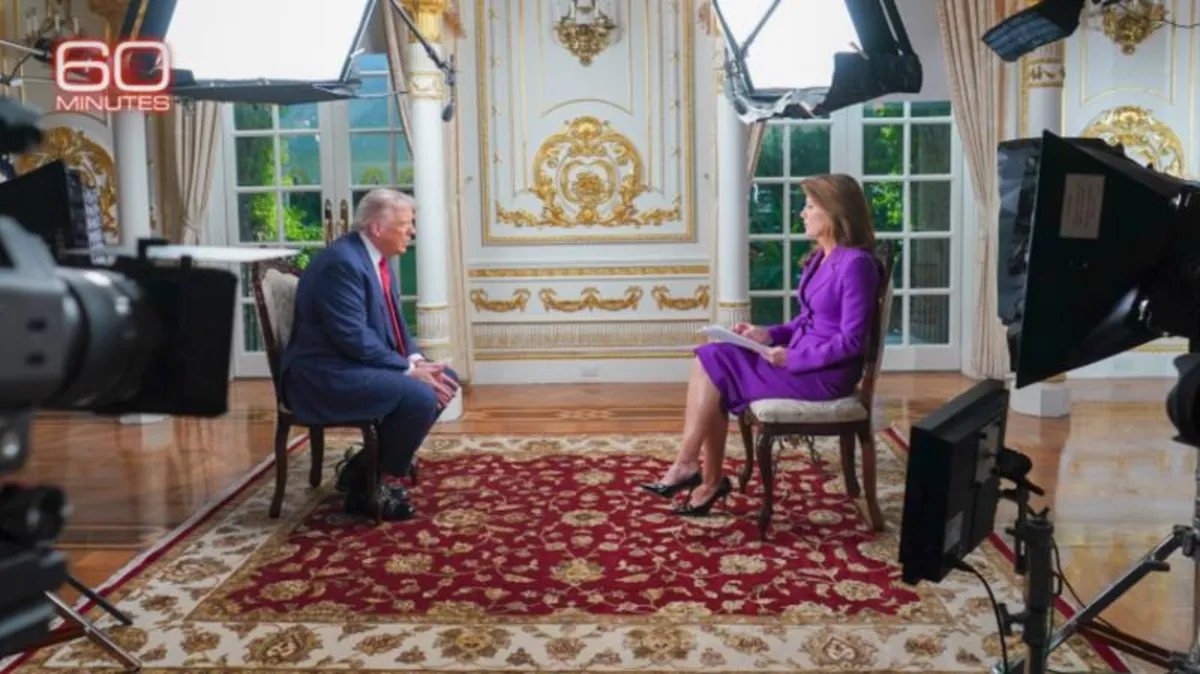
In a highly anticipated appearance on “60 Minutes,” former President Donald Trump discussed a range of topics with CBS anchor Norah O’Donnell. This interview marks Trump’s first since he filed a lawsuit against the show last year over the editing of an interview with Vice President Kamala Harris. During the interview, Trump exhibited an awareness of how his responses would be edited for time, stating, “You don’t have to use that one,” after a particularly awkward moment regarding crime in Washington, D.C.
The producers at CBS News opted to air only a portion—about one-third—of O’Donnell’s extensive sit-down with Trump on television. The rest of the interview was made available on YouTube, alongside a complete transcript of the 90-minute conversation posted online. O’Donnell engaged Trump on pressing issues, including cost-of-living increases, foreign policy challenges, and the possibility of a government shutdown. Her pointed questions included inquiries such as, “Are we going to war against Venezuela?” and “When will you declare ‘mission accomplished’ on immigration?”
Throughout the interview, O’Donnell maintained a challenging stance, effectively pressing Trump on his statements. At one point, she highlighted inconsistencies in his claims about the stock market, stating, “when the stock market is doing well, that doesn’t affect everybody.” This led to criticism from some liberal commentators, who felt O’Donnell did not provide enough pushback against Trump’s remarks. Former MSNBC host Joy Reid noted on social media that “Norah let Trump lie and lie with barely any pushback.”
Several moments from the interview quickly gained traction on social media. Trump’s assertion that immigration raids in the U.S. “haven’t gone far enough” sparked widespread discussion. Additionally, his response to a question about Binance founder Changpeng Zhao, whom he had recently pardoned, drew attention when he claimed, “I don’t know who he is.” When discussing the issues of cost-of-living increases, Trump suggested that people should blame his predecessor, President Joe Biden, while making vague promises to lower gas prices and improve healthcare.
O’Donnell did not shy away from challenging Trump directly. She reminded him, “But Mr. President, with all due respect, you’ve been talking about fixing the healthcare insurance plan since 2015.” Trump responded defensively, attributing the lack of progress to the Democrats. This exchange highlighted ongoing debates about healthcare reform and the effectiveness of political promises.
This interview holds particular significance as sit-downs with Trump have been rare during his second term. Trump’s choice to participate in “60 Minutes” is notable, especially since he had not accepted an interview request since 2020. The timing of this interview coincides with the anniversary of his lawsuit against the show, which had caused considerable unrest within CBS and its parent company, Paramount.
The lawsuit resulted in a controversial settlement, with CBS reportedly paying $16 million to Trump’s future presidential library. Many within the media criticized this move, with "The Late Show" host Stephen Colbert likening it to a “big fat bribe.” Following the settlement, the Trump administration approved Paramount’s merger with Skydance Media, paving the way for new leadership at CBS. Trump has expressed optimism about this change, stating that he believes the new ownership will lead to a “fairer” representation in the media.
During the interview, Trump specifically praised David Ellison and Bari Weiss, the new CBS News editor-in-chief. He expressed confidence in their leadership, stating, “They’re going to revitalize CBS — hopefully, they’ll bring it back to its former glory.” Trump’s enthusiasm for the new direction of CBS was evident, as he commented positively on the changes he perceives in the news landscape.
Trump’s interview with Norah O’Donnell on “60 Minutes” offers a glimpse into his perspective on current issues and the media. While the interview sparked debate over O’Donnell’s interviewing style and the handling of Trump’s statements, it also serves as a reminder of the complex relationship between political figures and the media. As CBS navigates its new leadership and Trump continues to engage with the press, the implications of this interview will likely reverberate in the political landscape.